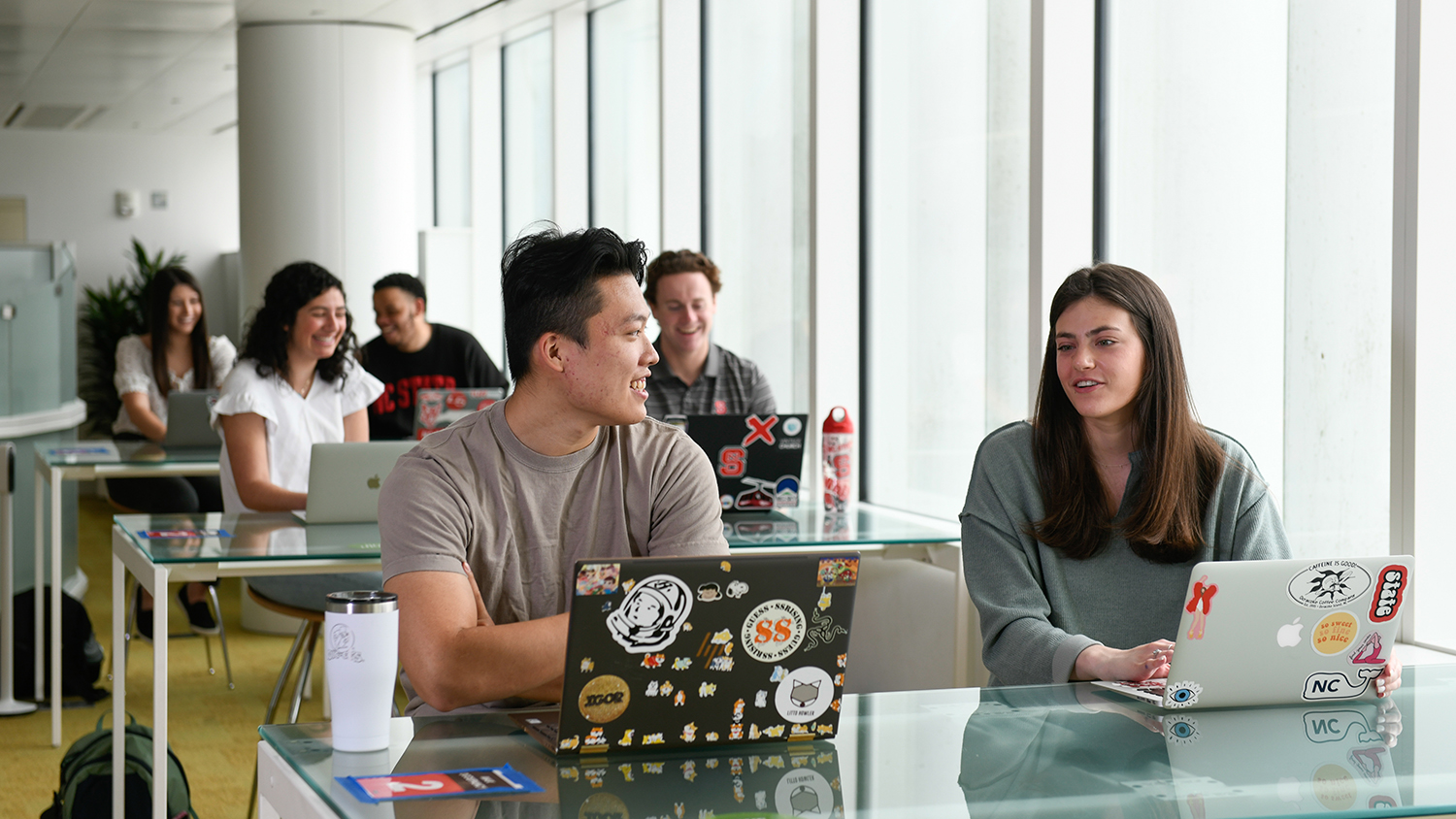Podcasting Makes the Airwaves at NC State
It seems like everyone has a podcast these days. Well, now you can add DELTA and a number of NC State faculty members to the list.
DELTA’s journey into podcasting began with an idea from Professor Steffen Heber and a DELTA Grant.
“I have a dog, and I walk several hours per day, and I listen to podcasts all the time –– maybe two hours per day, seven days a week. I read an article about how many people in the United States listen to podcasts, and I thought ‘I’ve never used podcasts in class as educational resources. Could I use it in class?'” Heber says.
To answer his question, he looked in familiar territory. Heber previously received a DELTA Grant to develop Adobe Flash animations for a computer science course. When that project turned into a larger grant from the North Carolina Biotechnology Center, Heber was inspired to do more.
Combining a love for podcasts and a desire to find additional ways to deliver engaging content in CSC 505: Design and Analysis of Algorithms, Heber applied for an exploratory grant during the 2019-2020 grant cycle. Not only would the project give in-person and distance education students the opportunity to learn in different ways and different places –– on the bus, walking to class, making dinner –– it would hopefully introduce students to the world of podcasts available for them to enjoy.
When Heber received the grant to develop his own podcasts and explore the medium with his students in September 2019, DELTA paired him with an interdisciplinary team composed of Lead Instructional Designer Cathi Dunnagan, Instructional Media Production Director John Gordon and Lead Multimedia Designer Rich Gurnsey.
Just like Heber, the project team was new to creating podcasts at the time. Each member brought their own expertise in media, design and storytelling, but they still had a lot to learn. Enter Podcasting on Podcasts (POP) at NC State.
“One of one of the best ways to learn is to actually ‘do’. So we created POP at NC State as a ‘do’ project. It allowed us to touch the equipment, to have goals, to actually have podcasts that we had to produce. We put ourselves in the seat that eventually Steffen would be put into himself,” says Gordon.
Over the course of the project, the team created three episodes of POP, which Gordon hosted. POP at NC State profiles faculty who have found success using podcasts in the classroom but all in very different ways, from covering emerging topics to creating assignments for students.
To make POP a reality, the team consulted with Digital Media Librarian Jason Evans Groth, affectionately known at NC State University Libraries as the “podcast guru.” Originally, their goal was to record POP in several different environments, such as a coffee shop, a sound booth, the DELTA studio and over the phone. Even though COVID-19 changed their plans, they pivoted successfully to Zoom calls.
By the end of recording, the team had learned valuable lessons not only about the technology and production behind podcasts but also about the educational benefits of the medium to inform their work with Heber.
First, they learned that podcasts are fairly easy and efficient to create. Once creators acclimate to the equipment and production tools, podcasts can be made quickly, which is especially useful for instructors who cover time-sensitive topics in their courses.
“Podcasting allows us to continue to create high-quality content to contribute to our classes so we can focus on issues that are relevant to what’s happening right now and integrate that almost immediately into our courses, so that’s pretty exciting,” says Professor Michael Kanters on the first full episode of POP. Kanters uses podcasting in his certificate course, Sports and Entertainment Venue Management.
Educational podcasts are a valuable tool for online and distance education learners. Not only can they provide the necessary variety to keep the course interesting, but they can also help to reduce feelings of isolation among students, classmates and instructors.
The team also learned that podcasts can be effective student assignments for a variety of courses and subjects, including STEM courses. Teaching Associate Professor Jenny Campbell assigns a semester-long podcasting project to students in her capstone zoology course, teaching them how to research and analyze a complex topic, but also how to tell a story, engage with their audience and adapt to new forms of media.
“The students at the end of the course have a different kind of confidence that they don’t get from getting a 100 on an exam,” Campbell says on POP. “It’s an opportunity to teach creativity.”
“It gives students an appreciation of communications that as scientists, they are going to need because they are always going to be in a position of having to report back information,” adds Gordon.
Gordon says faculty can quickly get up to speed with the technology needed to start a podcast. In his conversation with Marcy Bullock, director of professional development for the Career Development Center, he discovered that with the help of a student employee who spends roughly an hour editing and producing each episode, Bullock can produce episodes of ‘Pack Career Chats every week for her career development courses. The harder part is nailing your content.
“Understandably, the technology may seem intimidating at first, but the technology is not the most important part. The prep work you do before you even hit the record button — writing a good script, researching your topic, preparing the right questions, conducting a pre-interview — creates the foundation of a good podcast,” says Gurnsey.
Storyboards are a great way to get started. Dunnagan suggests adding details that enhance your story and bring it to life, like natural pauses, music and atmospheric noise.
“A podcast is not just a recording of you talking,” she says. “It’s critical to add in elements of the environment and the story –– those background sounds we hear without thinking any time we listen to a conversation or an interview. Sounds can inform and strengthen the story.”
All of these lessons made their way into Heber’s final products for CSC 505. Drawing inspiration from his favorite educational podcasts, he created a series of lecture summaries. Each episode encapsulates one to three lectures, giving students a high-level perspective of the course material that draws connections between key concepts.
Heber also assigns his students podcasts, which he highly recommends. In these “Hot Topic” podcasts, students produce content about individual algorithms to teach future and fellow students. He encourages them to write storyboards to discern what content works well in a podcast (and what doesn’t).
“In class, we do detailed analyses, we do formulas. If you want to compute things, that does not work in a podcast. You cannot read a formula, right? Nobody will be able to capture that,” Heber says.
He’s already started applying what he learned from his DELTA Grants to other courses, including CSC 530: Computational Methods for Molecular Biology, which he says lends itself even better to podcasting. Since the project wrapped in October 2020, he and the team have gathered plenty of advice that they’re ready to share with the NC State community.
Heber recommends getting to know podcasts before you get started by finding some podcasts that you enjoy simply for entertainment or by taking a short primer course and turning to experienced peers for guidance. It is also important to make sure that your podcast has a clear purpose in your course.
“These products shouldn’t stand alone in your courses. It needs to be integrated into your course. Everything you do in a course needs to be tied back to a learning outcome. If it’s not, then why is it there? Make sure there’s a very clean line between what you’re creating and the learning outcome you’re trying to achieve,” adds Kanters.
The project team recommends getting hands-on with podcasts to learn how they work. Starting out with free Digital Audio Workstations (DAWs) like Audacity and GarageBand is a great way to begin podcasting. It’s important to create artwork to go with your podcast, including banner art and a cover including the podcast name and design that reflects its topics and tone.
Fortunately, DELTA is here to help you take the leap into the world of podcasts. The team has produced a resource guide to help those interested in getting started in podcasting. We suggest listening to POP at NC State to find inspiration. The DELTA team is also open to answering questions about what they learned. Contact John Gordon at john_gordon@ncsu.edu.
